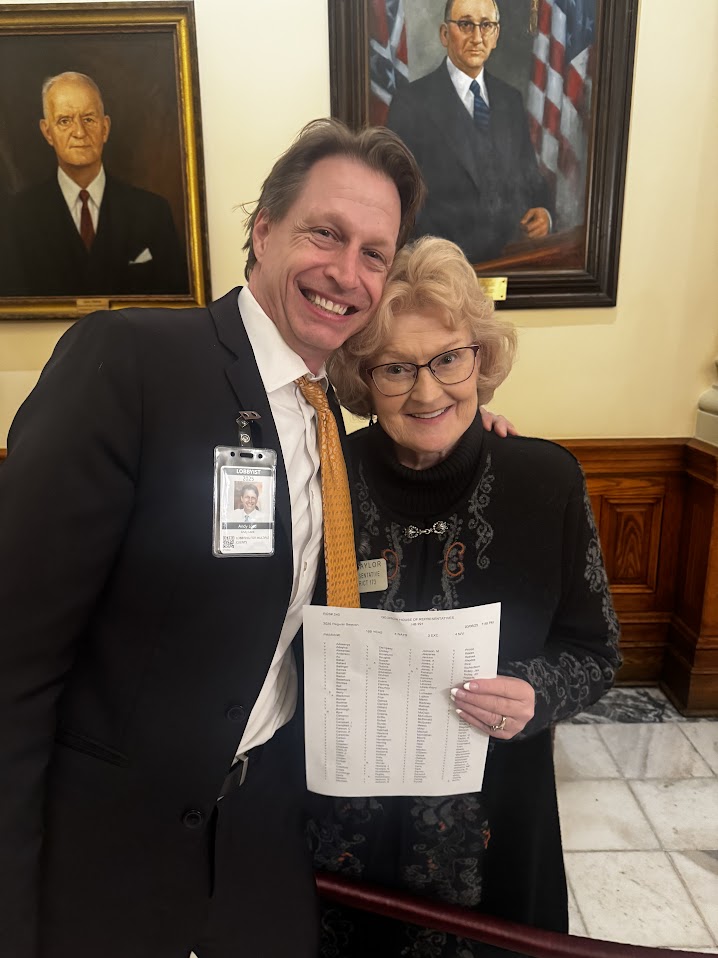An increasing number of factors are making it harder and more expensive for low-income Georgians to access and afford health care. Cuts made by the Trump administration, individuals losing insurance,…
- Home
- >
- Blog
- >
- Page 3
Blog
Health care in Georgia isn’t working for everyone. Georgians are struggling with the current system. People navigate complicated processes, wait weeks for care, and drive hours to see a doctor. These aren’t just statistics; they’re real stories from people who rely on the state’s Medicaid program, Georgia Pathways, to meet their health needs.
In an exclusive podcast episode produced by Georgians for a Healthy Future, we hear directly from people living these challenges every day. Their experiences show the barriers to care in Georgia and highlight why we must act now to improve access for everyone.
(more…)LEGISLATIVE UPDATE: WEEK 8

Crossover Day has come and gone, and the final stretch of the 2025 legislative session begins!
With just 12 legislative days left before Sine Die on April 4, lawmakers will move quickly to vote on the bills that made it through this key deadline. The legislature will pack the next three weeks with committee hearings, floor votes, and last-minute negotiations.
We’re thrilled to share that HB 291, the Community Health Worker certification bill, passed the House late Thursday night! The House passage of HB 291 is a big win for Georgia’s Community Health Workers and the communities they serve. Join us in sending a huge “Thank you!” to our partners at Georgia Watch and all the advocates who worked tirelessly to get this bill through the House—your efforts made this progress possible! Let’s keep up the good work to ensure this bill successfully passes through the Senate!
Keep reading for a full breakdown of what survived Crossover Day and what comes next for health care at the Capitol.
(more…)The Georgia Department of Community Health (DCH) has reopened the public comment period for the Pathways to Coverage® waiver extension. The new deadline to submit comments is March 19, 2025. This means you have another chance to speak up and demand better health care for Georgians.
Pathways to Coverage launched in July 2023 as a Medicaid program that requires participants to work or meet strict activity requirements to keep their health coverage. Unfortunately, the program has failed to deliver. For example:
(more…)LEGISLATIVE UPDATE: WEEK 7

New Bill to Protect Free Preventive Care (SB 262) Introduced
Last week, Senator Halpern introduced Senate Bill 262 with the support of six Republican co-sponsors! This bill is crucial to ensure that Georgians can continue accessing life-saving preventive health services without facing financial barriers.
Why This Matters
Since 2010, most health plans have been required to cover critical preventive services— such as cancer screenings, routine wellness visits, and mental health screenings—at no cost to patients. However, this vital benefit is under serious threat.
This summer, the U.S. Supreme Court will rule in Kennedy v. Braidwood, a lawsuit that seeks to overturn the free preventive services requirement. Nearly 5 million Georgians could lose guaranteed access to no-cost preventive care if the Court strikes down these protections.
(more…)On January 21, 2025, the Georgia Department of Community Health (DCH) announced its intent to submit a Section 1115 Demonstration Waiver Extension Application to the Centers for Medicare & Medicaid Services (CMS) for Georgia Pathways to Coverage® (Georgia Pathways). As part of the waiver extension process, DCH accepted public comments through February 20, 2025.
GHF submitted written comments during the public comment period to ensure that Georgians’ needs and experiences are reflected in the future of the Pathways program.
Our full letter to DCH is included below:
(more…)LEGISLATIVE UPDATE: WEEK 6

Community Health Worker Certification Bill (HB 291) Updated with Key Revisions
The bill to establish a certification process for Community Health Workers (CHWs) has been amended with some key updates. HB 291 is now scheduled to be heard today at 1:00 pm in the House Public and Community Health Committee. If passed, the bill will create a standardized certification process to support and expand Georgia’s CHW workforce. These trusted public health professionals help people navigate the health care system and access essential services, particularly in underserved communities.
What’s New in the Amended Bill?
(more…)LEGISLATIVE UPDATE: WEEK 5

Will New PBM Reforms Lower Drug Prices in Georgia?
Pharmacy Benefit Managers (PBMs) are companies that help insurance plans manage prescription drug benefits. They decide which medications are covered, negotiate prices with drug manufacturers, and set payment rates for pharmacies. While PBMs can lower drug costs by getting discounts from drug makers and pharmacies, they also have significant control over medication pricing, patient access, and pharmacy reimbursements. Critics argue that PBMs’ business practices can drive up costs for consumers and independent pharmacies, while supporters believe they help manage drug spending and ensure affordability. Additionally, PBMs are often owned by an insurer or pharmacy, meaning these PBMs are managed by the same stakeholders that set drug prices for consumers.
(more…)LEGISLATIVE UPDATE: WEEK 4

New Bill Aims to Create Georgia’s First Community Health Worker Certification Program
This week, lawmakers introduced House Bill 291, a bill that would create a state certification process for Community Health Workers (CHWs) in Georgia. CHWs are trusted public health professionals who connect Georgians, especially those in underserved communities, to health care and essential services. People know them by titles such as Patient Navigator, Community Health Advocate, and Promotora de Salud. CHWs play a vital role in improving health outcomes, delivering culturally-relevant information and care, and addressing social determinants of health like housing, transportation, and food insecurity.
HB 291 would help build a skilled and stable CHW workforce by establishing a certification process. The bill expands CHW’s ability to serve in various health care and community settings. HB 291 could also pave the way for Georgia Medicaid to reimburse CHWs in more settings and roles. Currently, Medicaid only covers CHW services provided through the Resource Mothers program, which supports certain pregnant and postpartum individuals. Certification could allow Medicaid to fund CHW services in more health care teams, public health programs, and care coordination efforts statewide.
If passed, HB 291 would recognize CHWs as essential members of Georgia’s health care system. It would ensure they have the training, support, and financial sustainability needed to continue their work.
This is one of GHF’s 2025-2026 legislative priorities, and we support this bill. We’ll keep tracking HB 291 and advocating for strong policies that support CHWs and expand access to care. Keep reading for more updates!
(more…)LEGISLATIVE UPDATE: WEEK 3

New Medicaid Expansion Bill has Bipartisan Support
A new bill, Senate Bill 50, to expand health insurance to low-income Georgia adults was introduced in the Senate this week. For the first time since Medicaid expansion became available to states, four Republican senators joined Democrats in support of a legislative solution to close Georgia’s coverage gap! The bill would create a new program called “PeachCare Plus”. It is nearly identical to the PeachCare Plus bill introduced during last year’s legislative session, the first Medicaid expansion bill to receive a legislative hearing in Georgia. Rather than expanding the state-run Medicaid program, SB 50 would introduce a private insurance model, using federal dollars to purchase coverage for eligible individuals (adults with incomes below 138% of the federal poverty level) through Georgia’s health insurance marketplace.
Too many Georgians are forced to choose between medical care and paying their bills. Closing Georgia’s health insurance coverage gap would provide life-saving coverage to thousands of uninsured Georgians. We support this legislation and will keep you updated as it moves through the legislative process.
Read on for key takeaways from other bills on our radar, and opportunities to advocate with us and our partners at the Capitol.
(more…)LEGISLATIVE UPDATE: WEEK 2

Severe Weather Closed the State Capitol for Most of the Week
Severe weather disrupted last week’s legislative schedule, postponing budget hearings and other activities. As a result, some state agencies will now present their budget requests this week. Since there wasn’t much action at the Capitol last week, we’ve covered a few more health-related bills from the first week of session below.
Update on State Agency Budget Presentations:
State agency budget presentations now begin this week. For the latest schedule, check out the legislative session schedule here. Two upcoming meetings on our radar are:
- Appropriations Subcommittee on Human Resources (House)–where legislators will hear presentations about the human resource needs of the Departments of Human Services and Behavioral Health & Developmental Disabilities, as well as the Georgia Council on Developmental Disabilities
- Appropriations Subcommittee on Health (House)–where legislators will hear budget presentations from the Departments of Community Health and Public Health
Stay Connected
Archive
- November 2025
- October 2025
- September 2025
- August 2025
- July 2025
- June 2025
- May 2025
- April 2025
- March 2025
- February 2025
- January 2025
- October 2024
- May 2024
- April 2024
- March 2024
- February 2024
- January 2024
- December 2023
- October 2023
- July 2023
- April 2023
- March 2023
- February 2023
- January 2023
- December 2022
- October 2022
- September 2022
- August 2022
- June 2022
- April 2022
- March 2022
- February 2022
- January 2022
- December 2021
- November 2021
- October 2021
- September 2021
- August 2021
- June 2021
- May 2021
- April 2021
- March 2021
- February 2021
- January 2021
- December 2020
- November 2020
- October 2020
- September 2020
- July 2020
- June 2020
- May 2020
- April 2020
- March 2020
- February 2020
- January 2020
- December 2019
- November 2019
- October 2019
- September 2019
- August 2019
- July 2019
- May 2019
- April 2019
- March 2019
- February 2019
- January 2019
- December 2018
- November 2018
- October 2018
- September 2018
- August 2018
- July 2018
- June 2018
- May 2018
- April 2018
- March 2018
- February 2018
- January 2018
- December 2017
- November 2017
- October 2017
- September 2017
- August 2017
- July 2017
- June 2017
- May 2017
- April 2017
- March 2017
- February 2017
- January 2017
- December 2016
- November 2016
- October 2016
- September 2016
- August 2016
- July 2016
- June 2016
- May 2016
- April 2016
- March 2016
- February 2016
- January 2016
- December 2015
- November 2015
- October 2015
- September 2015
- August 2015
- July 2015
- June 2015
- May 2015
- April 2015
- March 2015
- February 2015
- January 2015
- December 2014
- November 2014
- October 2014
- September 2014
- July 2014
- May 2014
- March 2014
- January 2014
- December 2013
- October 2013
- September 2013
- August 2013
- July 2013
- June 2013
- May 2013
- April 2013
- March 2013
- February 2013
- January 2013
- November 2012
- October 2012
- September 2012
- July 2012
- June 2012
- May 2012
- April 2012
- March 2012
- February 2012
- January 2012
- December 2011
- November 2011
- October 2011
- September 2011
- August 2011
- July 2011
- June 2011
- April 2011
- March 2011
- February 2011
- January 2011
- December 2010
- November 2010
- October 2010
- September 2010
- August 2010
- July 2010
- June 2010
- May 2010
- April 2010
- March 2010
- February 2010
- January 2010
- December 2009
- November 2009
- October 2009


